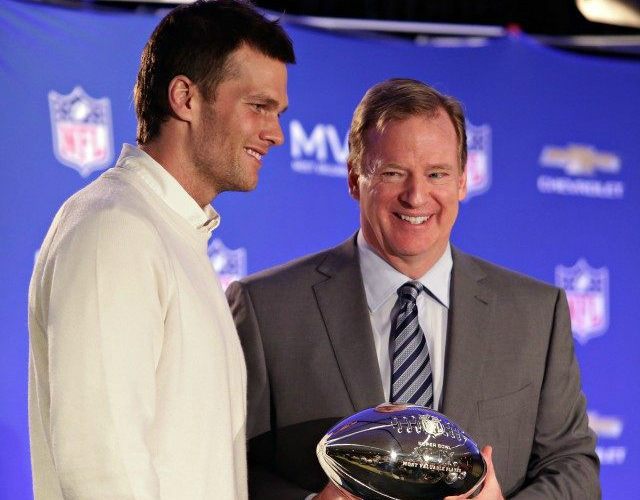The NFL once called Ted Wells independent. Now the league calls him its lawyer.
The NFL Players Association seeks correspondence pertinent to Deflategate between the NFL and the law firm where Ted Wells serves as a partner. NFL Commissioner Roger Goodell refuses to hand it over, citing attorney-client privilege. Of course, the league’s gamesmanship cites attorney-client privilege for correspondence related to Ted Wells’ law firm rather than Ted Wells himself. But what, really, is the difference?
Goodell repeatedly characterized Wells as a fair, impartial arbiter during the lawyer’s investigation into Tom Brady. For instance, immediately after Wells issued his report finding the New England Patriots quarterback “generally aware” of a scheme to deflate footballs the commissioner released a statement, saying, “I want to express my appreciation to Ted Wells and his colleagues for performing a thorough and independent investigation.”
How can the NFL simultaneously characterize Ted Wells as “independent” and correspondence related to his investigation as “privileged” because of an attorney-client relationship?
Roger Goodell devoted a mere footnote in his Tuesday letter to explaining this verbal legerdemain.
“The NFLPA takes the position that because the NFL asserted attorney-client privilege for certain of its communication with Paul, Weiss and because a Paul, Weiss attorney asked questions of witnesses at the appeal hearing, the investigation was not independent,” Goodell writes. “For the reasons stated in the text, among others, I disagree. But this disagreement does not matter: If the entire investigation had been conducted by in-house NFL employees instead of an outside law firm, I would still view it as a thorough and reliable basis for my findings and conclusions and a thorough and detailed means of providing Mr. Brady and the NFLPA notice of the conduct detrimental for which the suspension was imposed.”
Does not matter? Then why does the commissioner keep the matter a secret. Beyond betraying a lack of transparency, the footnote reveals a lack of fair-mindedness. Goodell clearly states that he would regard an investigation by the NFL as one no different in its independence from that of a litigator employed, directly at least, by a third party. So why appoint Ted Wells in the first place? To give the appearance of impartiality. And as the footnote shows, Roger Goodell appointed Ted Wells for the sake of appearance rather than impartiality.
The same impulse that drove Goodell to hear the appeal of his initial decision to suspend Tom Brady four games drove him to hire the league’s law firm to conduct an “independent” investigation.
The NFL dismissed rather than dealt with this glaring conflict of interest and unbecoming secrecy in a footnote. Roger Goodell called a misdirection play by obsessing over Tom Brady’s phones in the way he once obsessed over his footballs. Psychology provides a term for attributing the undesirable traits in oneself to another: projection.
Linebackers fall for traps. Safeties get sucked closer to the line of scrimmage on flea-flickers. Defensive ends abandon their containment duties on reverses. Goodell’s trick play herds the public to fixate on Tom Brady’s phone and look away from the NFL’s secret correspondence with the law firm that investigated Deflategate. Goodell admits, again in a footnote, that Brady permitted the league to peruse all of his electronic correspondence provided it receive permission from the second party sending or receiving the messages. But a man who spent his entire offseason transfixed on the air-pressure of balls—spending millions on an investigation, changing referee protocols, sitting over hearings, etc.—calls the idea of obtaining permission from Brady’s correspondents “simply not practical.”
It’s possible that Brady hides something in his phone. It’s also possible that the phone contains texts and pictures extraneous to the investigation that he wishes to shield from eyes jaundiced toward him. It’s possible the NFL hides matters pertinent to Deflategate in its “privileged” correspondence. It’s also possible that the league simply wishes to shield information from a hostile NFLPA on a possible fishing expedition.
The difference between the two sides claiming privacy involves the aforethought of the NFL to hire its investigator from a law firm it hires to conduct legal matters for the league. This makes the investigation not just devoid of independence but necessarily shady. The league knew beforehand it could hide in the shadows any dirty dealings by claiming attorney-client privilege. It could simply send sensitive correspondence on Deflategate to Wells’ law firm rather than Wells himself to hide it during future proceedings. This appears precisely why Roger Goodell hired from inside the league’s law firm to conduct an “independent” investigation. Transparency for thee, but not for me.
Rather than simply failing to cooperate, Goodell made a deliberate effort to insure that investigators would never have access to information that he had been asked to produce. Put differently, there was an affirmative effort by Goodell to conceal potentially relevant evidence and to undermine the investigation.
My apologies to Roger Goodell. He wrote these words in Tuesday’s letter about Tom Brady. They apply more readily to him.

COMMENTS
Please let us know if you're having issues with commenting.